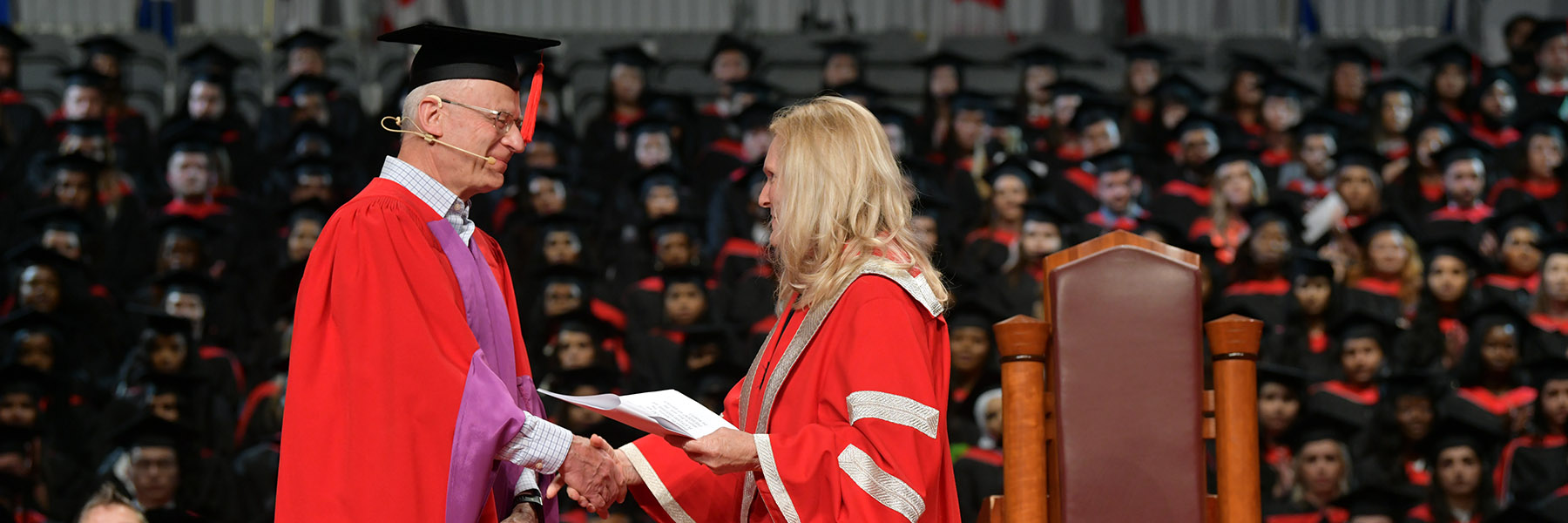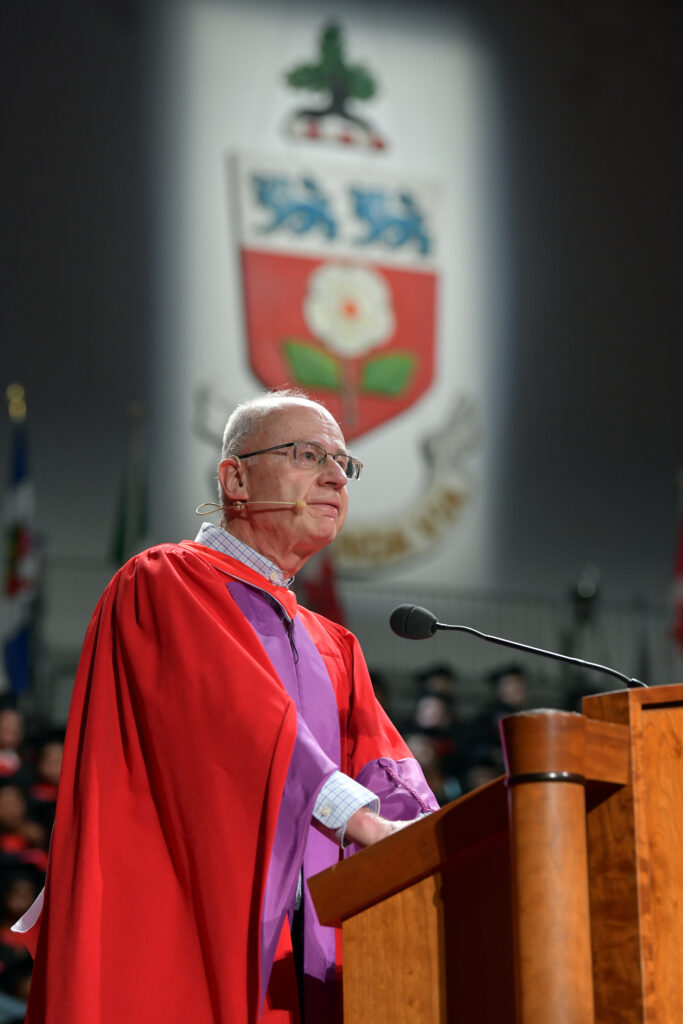
By Alysia Burdi
At York University’s 16th spring convocation ceremony, held on Monday, June 13, honorary doctor of laws degree recipient Steven Lewis told Faculty of Health graduating students there is little room for boredom and much room for laughter in the workplace.
Making light of the “disorientation and weirdness” of learning through the COVID-19 pandemic, Lewis acknowledged the creativity, agility and discipline each student has acquired since beginning their journey at York.
“You've done it, you’ve made it, you’re through the tunnel and out into the light and ready to rock the world,” said Lewis.

Acknowledging his “irregular career path” and upbringing in Moose Jaw, Saskatchewan, Lewis recalled the day he received a call from Rhonda Lenton, York University president and vice-chancellor's office about receiving an honorary degree. In his address to the convocation, Lewis referenced his namesake, former Canadian Ambassador to the UN, Stephen Lewis and joked if students also share a name with someone like Beyonce Knowles or Nelson Mandela, they share his pain.
However, despite sharing a name, a strong tie to the University and a shared connection to honour their work and society, there are differences the individuals have in their career paths.
The honorary degree recipient, Lewis is a profoundly articulate and persuasive communicator with a strong commitment to social justice and equity. For more than three decades, his ideas and perspectives have been sought by prime ministers, premiers, senior civil servants, and health professional associations all across Canada.
“York honoured my illustrious namesake 36 years ago. I was assured President Lenton actually wanted to speak to me and now the celebrated Stephen Lewis and I are forever joined in confusion in the folklore of York University. It’s a much better deal for me than for him, and I am grateful for it,” Lewis bantered.
Speaking to neuroscience, psychology, kinesiology, nursing, policy, management, informatics, disability studies and global health graduates, Lewis noted “your field spans from the cell to the planet. What unites them, as President Lenton said, is the intimate connection between health and social justice." Lewis further stated, “York’s founding ethos was and is social justice. The world desperately needs more of it and your understanding of what it means for health is not only great grounding for your careers but is great grounding for your role in the wider world as well.”
After graduating from the University of Saskatchewan with a master's in political science, Lewis built a reputation as an innovative and inspiring public servant through roles such as the executive director of the Saskatchewan Health Research Board, director of the Indian Health Services at Health Canada, and CEO of the Saskatchewan Health Services Utilization and Research Commission. He has been the full-time president of his own health care consulting firm since 1999, and an adjunct professor of health policy at Simon Fraser University since 2007. In his capacity as a health services thought leader and consultant, Lewis served as an external advisor to York University in 1998. His contributions led directly to the establishment of the School of Health Policy and Management.
Twenty years later the school is host to more than 1,100 students studying health policy, health management, health studies, health informatics, and critical disabilities. He is widely recognized as one of Canada's most influential and distinguished health system consultants, innovators, and researchers.
Lewis noted formal education and newly minted degrees are springboards to a life of service.
“Every week heralds another scientific and technological achievement that are truly wondrous, and yet the planet is endangered, life expectancy has declined for the first time in centuries, and international relations are frayed. These problems are not technical; they are political. Durable and just solutions require deliberation, ingenuity and collective action grounded in human solidarity. Health – who has it, who doesn’t, what we invest in, what we ignore – is fundamentally political.”
Lewis expressed he is uplifted and sometimes “blown away” by the energy and commitment of younger generations, and their willingness to experiment and adapt. He encouraged graduates to “step up, lead and nudge my generation out of the way and all will be better.” He went on to offer some gentle advice to the graduates – values that he too tries to follow in his everyday life. “Never stay in a job where you are bored. Bored people don't make the world better... No job is a thrill a minute, but if you find yourselves bored for a few months, move on, there’s lots to do.”
Lewis also encouraged graduates to work where people laugh.
“Laughter doesn’t just soothe the soul, it’s much more than that,” he said. “President Volodymyr Zelenskyy of Ukraine is a comedian. Many think that’s an odd background for a politician. I think it’s the source of his political genius and courage. Good comedy is a lens on our humanity... Comedy makes us see truths we might otherwise not see.”
Lewis’ final note to graduates was to discover, apply, help people, repair politics, create community, seek justice, and save the planet. Acknowledging how tall of an order it may seem, he encouraged graduates to laugh at how big it is, to laugh often as they take on challenges throughout their future endeavours, to move on when bored and to learn from comedy.
“If you can manage that, the burdens will not seem so heavy, the triumphs will be sweeter, and you will thrive. And through your efforts, so will the world.”
